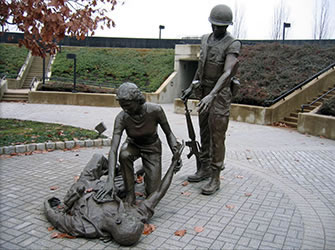Adverse US District Court Burn Pit Decision
Here’s What’s Coming Next in the Battle Over Burn Pit Benefits
House Unanimously Passes Bill to Improve Burn Pit Registry
Legislation Passes Senate to Help Veterans Exposed to Toxic Burn Pits
Nov 1 – U.S. Senators Amy Klobuchar (D-MN) and Thom Tillis (R-NC) have announced that their bipartisan legislation to help veterans who have been exposed to toxic burn pits has passed the Senate as part of the National Defense Authorization Act for Fiscal Year 2018.
July 19 – I am compelled to comment on this denial by the US District Court in Maryland. This is reminiscent of the Agent Orange Class Action Suit (May 1985) in the Southern District of New York, where the US Court of Appeals, 2nd Circuit (in May 1987) severely limited the "class" (all Vietnam veterans); and, ultimately provided VERY LIMITED redress.
This conclusion (published below) from the final three pages of the decision (at the link above) makes me believe that the federal courts (supposedly an independent third leg of our constitutional system) abrogates its responsibility by throwing the burden of redress to the Congress (an uncertain future at best, given the current political chaos inside the beltway) which may grant redress once all these veterans are dead; much like what happened to the mustard gas veterans of World War One (my maternal grandfather was one of those) and us Vietnam veterans. Nothing ever changes!
Paul Sutton
Conclusion – US District Court Decision, #09318721818
As it observed in its 2013 Opinion, the Court is not unsympathetic to the claims of the Plaintiffs. Many of them have been harmed, at least to some extent, by the use of open burn pits or by the water that they drank in Iraq or Afghanistan. However, as to those Plaintiffs who claim injury while serving in the military, they are not without significant remedies. See Defense Base Act, 42 U.S.C. §§ 1651-1654; War Hazards Compensation Act, 42 U.S.C. §§ 1701-1706.
In addition, bipartisan legislation was recently introduced in Congress to provide additional remedies to persons affected by the burn pits. See Helping Veterans Exposed to Burn Pits Act, H.R. 1279, S. 319, 115th Cong. (2017) (assigned to the House Veterans’ Affairs and Armed Services Committees and the Senate Veterans’ Affairs Committee, respectively).
The fairly limited case law applicable in this case establishes legal principles that this Court has applied based upon its factual findings. Those cases, however, are not a perfect “fit” for the circumstances of this case. The sweeping, generalized decade-long multi-war zone claims made by the Plaintiffs are factually quite different from the far more limited and discrete circumstances in cases involving an individual military convoy (Carmichael), electrocution of a soldier in a shower (Harris), electrocution of a workman (Taylor), and torture (Al Shimari). The legal principles established in those cases were not applied to sweeping claims of the nature made by the Plaintiffs in the cases now before this Court.
Unlike those cases, the cases before this Court do not involve, for example, an allegation that a KBR employee, contrary to both military operational command and contracting officer directives, burned a specific banned substance causing a specific injury to an identified individual on a given date. If that were the case, it is possible that a justiciable question might be presented that would not be preempted as in the “discrete manner” exception described in Saleh, 580 F.3d at 9. That is not, however, the nature of these cases. The allegations made by the Plaintiffs are anything but discrete. They are not specific to a particular time, date or place, but relate primarily to the use of open burn pits and the furnishing of water in Iraq and Afghanistan stretching over a period as long as a decade.
Having chosen to assert broad class action claims that ultimately resulted in the creation of this multi-district litigation, the Plaintiffs must stand on the centrality of their common issue of fact, i.e., the use of open burn pits. As discussed at length above, the use of open burn pits was a quintessential military decision made by the military, not KBR, and was a decision driven by the exigencies of war.
For the foregoing reasons, the Court will, by separate Order, grant the Defendants’ Motion to Dismiss [ECF No. 451], deny Defendants’ Motion to Strike Plaintiffs’ Hundreds of Declarations [ECF No. 463], and direct that all complaints be dismissed.
Date: July 19, 2017 /s/
Roger W. Titus
United States District Judge


